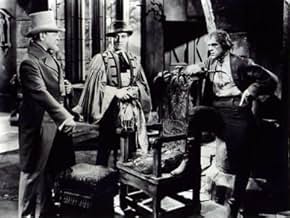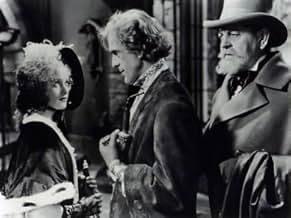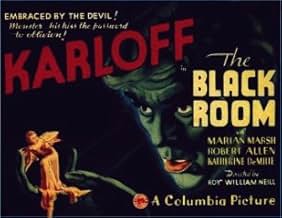Ignoring an ancient prophecy, evil brother Gregor seeks to maintain his feudal power on his his Tyrolean estate by murdering and impersonating his benevolent younger twin.Ignoring an ancient prophecy, evil brother Gregor seeks to maintain his feudal power on his his Tyrolean estate by murdering and impersonating his benevolent younger twin.Ignoring an ancient prophecy, evil brother Gregor seeks to maintain his feudal power on his his Tyrolean estate by murdering and impersonating his benevolent younger twin.
- Mashka
- (as Katherine de Mille)
- Court Clerk
- (uncredited)
- Anton as a Child
- (uncredited)
- Franz - Captured Assassin-Villager
- (uncredited)
- Gregor's Hairdresser
- (uncredited)
- Karl - Lead Villager
- (uncredited)
- Member of the Court
- (uncredited)
- Member of the Court
- (uncredited)
- Michael the Footman
- (uncredited)
- Gatekeeper
- (uncredited)
Featured reviews
Incidentally, is it just me, or does the loud brass fanfare that occurs in the title sequence, and throughout the film at dramatic moments, sound like part of the song "Come Rain or Come Shine" ("days may be cloudy or sunny...")? I just found it a bit distracting to suddenly picture Judy Garland in my mind at all the most tense and dramatic moments of the story.
By Columbia Pictures standards, this film is almost opulent, having several sets and a number of outdoor shots, and having good actors, costumes, technicians and atmosphere all around. But, since it is a Columbia Picture, central Europe looks amazingly like Southern California. Still, it proves that Universal did not have a monopoly on horror in the 1930's.
This is not a supernatural film, except perhaps in the fact that it deals with the subjects of prophecy and fate...it is instead a psychological horror film and so it helps to have the right set of expectations going in. In a way, this film is a kind of precursor to the ambiguous metaphysics and psychological themes of the 1940's Val Lewton horror/noir classics.
What makes this film stand out is Karloff's brilliant performance in the double role of twin brothers, one evil and one good. Karloff is completely convincing in both parts, and it is a genuine pleasure to watch him. It is also striking that even without monster make-up Karloff can scare the pants off you, when he chooses.
Modern horror fans are liable to have trouble accessing this film, but it is recommended to fans of classic horror and classic film in general.
Karloff plays twin brothers (one good and one evil, naturally) who have a nasty family prophecy hanging over their heads, seemingly solved when a room inside their castle is sealed up. Also helping matters is the fact that Anton, the nice younger twin, travels the world for a while before being summoned home by his brother, a cruel despot who abuses his position of power. This leads to a great twist, but it won't be revealed here. Gregor, the evil twin, has his eye on beautiful young Thea (the radiant Marian Marsh), and intends to marry her despite the fact that she's already attached to another man, Lt. Lussan (Robert Allen), whom he frames for murder.
"The Black Room" does have its assets, but chief among them are the dual Karloff performances; he's superb at creating two very different personalities. His delicious villainy when he plays Gregor easily rivals his equally compelling turn in "The Body Snatcher" a decade later. Also doing creditable work are Thurston Hall, Katherine DeMille, John Buckler, and Henry Kolker. The dog, Thor, is great too.
Highly recommended to Karloff fans.
Eight out of 10.
Marion Marsh hits just the right note in a fine youthful performance as the stunningly beautiful daughter of a local official, committed by family to potential lifetime unhappiness and depravity at the hands of the despicable Baron. Ms. Marsh was one of the most beautiful women ever in the long history of film, but is unaffected by her looks and is almost always natural and effective in her roles. Probably the best word to describe her is simply that she is likable- a good trait for a movie star but too often lacking in many of them.
This film moves along energetically in juggernaut fashion and is marvelously entertaining, totally without any padding or slowness. Its a winner.
Did you know
- TriviaPresent existent version, as presented on Turner Classic Movies, bears title and end credits redesigned for the 1955 wide screen re-release.
- GoofsThe film is set in the early 1800s, yet a statue of St. Therese of Lisieux (Therese Martin) is prominently displayed in the castle three times (at around 17 mins, 40 mins, and 47 mins). Therese Martin was not born until 1873. Furthermore, no statue of St. Therese was made or displayed until after she was canonized, in 1925.
- Quotes
Mashka: Don't you want to kiss me?
Baron Gregor de Bergmann: [Cutting a juicy pear with his knife and eating it as he talks] A pear is the best fruit!
Mashka: Every time you see her, you want to be rid of me.
Baron Gregor de Bergmann: [Seemingly ignoring her] Lots of juice in a pear!
Mashka: Well, you'll find out I'll not be got rid of so easily! Do you hear what I say?
Baron Gregor de Bergmann: Adam should've chosen a pear.
Mashka: You've got it all planned, haven't you? You're gonna marry her. You're gonna make her your wife, your baroness!
Baron Gregor de Bergmann: I like the feel of a pear! And when you're through with it...
[He carelessly tosses it across the room]
- ConnectionsFeatured in Monday Night Fright: The Black Room (1962)
- How long is The Black Room?Powered by Alexa
Details
- Release date
- Country of origin
- Language
- Also known as
- The Black Room
- Filming locations
- Culver City, California, USA(Exterior Castle set and Exterior Tyrolean town at the RKO Forty Acres Backlot)
- Production company
- See more company credits at IMDbPro
- Runtime
- 1h 8m(68 min)
- Color
- Aspect ratio
- 1.37 : 1



































